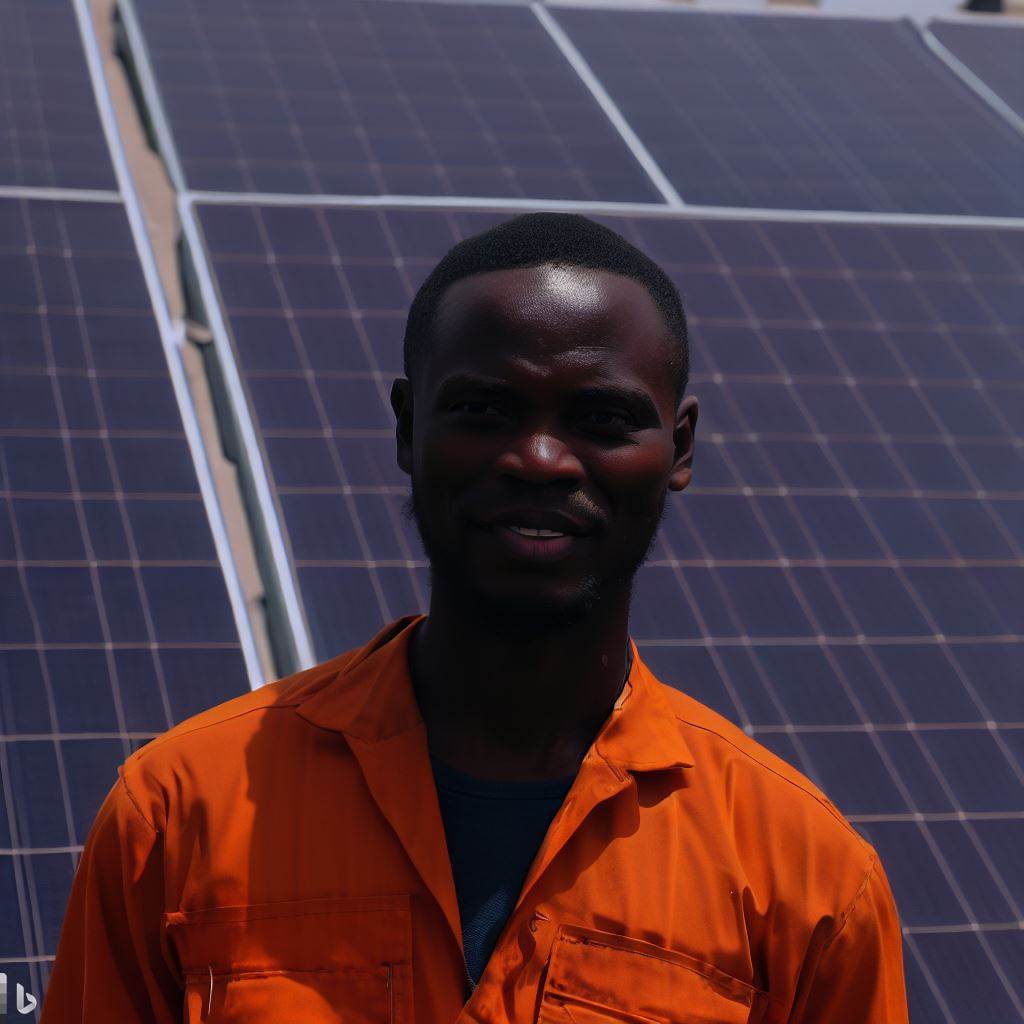Introduction
Solar PV in Nigeria is gaining popularity as a sustainable energy solution in the country.
In this blog post, we will delve into the daily experiences of a solar PV installer in Nigeria.
From dawn till dusk, we will explore the challenges, triumphs, and impact of their work.
Importance of Solar PV in Nigeria
The energy crisis in Nigeria affects both urban and rural areas, hindering economic growth and productivity.
Unreliable power supply forces households to use costly and polluting generators, worsening environmental degradation.
Solar PV technology generates electricity from sunlight, a renewable resource, reducing greenhouse gas emissions and fossil fuel dependency.
Solar PV systems offer long-term cost-effectiveness and require minimal maintenance, benefiting remote areas.
Installing solar PV systems improves energy security, reducing reliance on the national grid.
The solar PV installation industry in Nigeria is growing due to increasing demand for clean energy.
Companies provide comprehensive services, assessing solar potential, designing customized systems, and procuring equipment.
Installation involves mounting panels, connecting wiring, and integrating with existing infrastructure.
Thorough testing and commissioning ensure optimal performance, with grid connection or energy storage for uninterrupted supply.
Installers prioritize quality, safety, and user training throughout the process, promoting clean, reliable energy solutions.
In review, solar PV technology addresses Nigeria’s energy crisis, providing clean, cost-effective electricity and fostering economic growth.
Read: The Role of Solar PV Installers in Nigeria’s Grid
Qualifications and Training of Solar PV Installers
When it comes to becoming a solar PV installer, there are several necessary qualifications and expertise that one must possess.
Additionally, there are various training programs and certifications available to help individuals acquire the required skills and knowledge in this field.
Continuous professional development also plays a significant role in keeping solar PV installers updated with new technologies.
A. Qualifications and Expertise
- Electrical Engineering background: A strong foundation in electrical engineering is essential for solar PV installers.
- Understanding of solar PV systems: In-depth knowledge of solar PV technology, components, and system design is necessary.
- Problem-solving skills: Installers should have the ability to diagnose and solve technical issues efficiently.
- Physical fitness: Being physically fit is important because solar PV installation requires working at heights and lifting heavy equipment.
- Attention to detail: Installers must possess keen attention to detail to ensure accurate installations and effective troubleshooting.
B. Training Programs and Certifications
Several training programs and certifications are available to help individuals enhance their skills and gain recognition in the solar PV installation industry.
These include:
- NABCEP Certification: The North American Board of Certified Energy Practitioners offers various certifications for solar PV professionals.
- Manufacturer Training Programs: Many solar PV equipment manufacturers provide training courses on their specific products.
- Solar Energy International (SEI): SEI offers comprehensive online and in-person training programs for solar PV installation.
- Local Vocational Schools and Colleges: Many educational institutions offer courses and programs in solar PV installation.
- Apprenticeships: Joining an apprenticeship program under experienced solar PV installers can provide valuable hands-on training.
C. Continuous Professional Development
The solar PV industry evolves rapidly, with new technologies and advancements emerging regularly.
To stay updated and competitive, continuous professional development is crucial for solar PV installers.
Here’s how installers can keep up:
- Attending Workshops and Conferences: Participating in industry events helps professionals learn about the latest trends and network with experts.
- Subscribing to Industry Publications: Reading trade magazines and subscribing to online resources provides valuable insights into new technologies.
- Participating in Webinars and Online Courses: Online platforms offer webinars and courses on topics like advanced system design and emerging solar technologies.
- Networking with Peers: Engaging with other solar PV installers through professional associations and forums fosters knowledge sharing.
- Continuously Learning: Installers should regularly seek opportunities to expand their knowledge through self-study and research.
In summary, becoming a solar PV installer requires specific qualifications and expertise in electrical engineering, along with an understanding of solar PV systems.
Training programs and certifications, such as NABCEP, manufacturer training, and local educational institutions, help individuals acquire the necessary skills.
Continuous professional development through workshops, publications, webinars, networking, and self-learning ensures installers stay updated with the latest technologies in this fast-paced industry.
Read: Nigeria’s Solar PV Industry: A Growth Outlook
Tools and Equipment Used by Solar PV Installers
When it comes to solar PV installation, having the right tools and equipment is crucial for a successful and safe installation.
With the advancements in technology, the industry has seen a significant evolution in the tools used.
Here, we will discuss the various tools and equipment essential for solar PV installation, the advancements in technology and equipment, and the importance of using high-quality tools for effective and safe installations.
A. Solar Panel Mounting Systems
- Racking systems: They provide a sturdy framework to mount solar panels on rooftops or ground mounts.
- Clamps and brackets: Used to securely attach solar panels to the racking systems.
B. Solar Panel Installation Tools
- Drills and drivers: Essential for drilling holes and installing bolts for the racking systems.
- Wire cutters and strippers: Used to cut and strip wires during the installation process.
- Torque wrenches: Necessary for ensuring proper torque on bolts and fasteners.
C. Electrical Equipment
- Inverters: Convert solar power into usable electricity for homes and businesses.
- Charge controllers: Regulate the charge from solar panels to batteries for proper energy storage.
- Meters and monitoring systems: Used to measure and monitor the performance of solar panels and the overall system.
D. Safety Equipment
- Personal protective equipment (PPE): Includes gloves, goggles, helmets, and safety harnesses to ensure installer safety.
- Voltage testers: Used to detect the presence of electrical current and ensure safety during installation.
- Fire extinguishers: Important for preventing and extinguishing fires that may occur during the installation process.
E. Advancements in Technology and Equipment
The solar PV industry has witnessed significant advancements in technology and equipment, leading to more efficient and reliable installations.
- High-efficiency solar panels: Manufactured using advanced materials and technologies to maximize energy output.
- Smart inverters: Enable remote monitoring and advanced functionalities to optimize energy production.
- Battery storage systems: Allow for storing excess energy generated during the day for use during nighttime or cloudy days.
- Computer-aided design software: Helps installers accurately analyze and design solar PV systems for optimal performance.
F. Importance of Using High-Quality Tools
Using high-quality tools is vital for ensuring effective and safe solar PV installations.
- Reliability: High-quality tools are less likely to break or malfunction during the installation process, minimizing downtime.
- Efficiency: Proper tools enable installers to work efficiently, resulting in faster installations and reduced labor costs.
- Safety: High-quality tools come with safety features, reducing the risks of accidents and injuries during installation.
- Durability: Investing in good tools saves money in the long run as they last longer and require fewer replacements.
In essence, the solar PV industry relies heavily on specialized tools and equipment for successful installations.
With advancements in technology, installers now have access to more efficient and reliable tools.
generally, it is crucial to prioritize the use of high-quality tools to ensure effectiveness, efficiency, and most importantly, the safety of solar PV installations.
Read: Solar PV Installer: Skills Needed in Nigeria

A Day in the Life of a Solar PV Installer in Nigeria
Providing reliable and sustainable energy solutions, solar PV installers play a crucial role in Nigeria’s renewable energy sector.
Let’s take a closer look at what their typical workday entails:
A. Overview of the Typical Workday
- Solar PV installers start their day early, often before sunrise, to make the most of daylight.
- They gather the necessary tools, equipment, and materials before heading out to the installation site.
- Upon arrival, they assess the site conditions, considering factors like available space, orientation, and shading.
- Installers work closely with the site owners to understand their energy needs and ensure the system is designed accordingly.
- They then proceed with mounting the solar panels, ensuring proper alignment and secure attachment.
- The next step involves wiring the panels to the inverter and connecting the system to the electrical grid.
- Installers conduct thorough testing to ensure the system is functioning efficiently.
- Once everything is in order, they provide the necessary instructions and advise the owners on system maintenance.
B. Planning and Site Assessment Process
Prior to installation, meticulous planning and site assessments are conducted:
- Solar PV installers collaborate with clients to determine their energy requirements and budget constraints.
- They assess the location’s solar potential, considering factors like sunlight intensity and hours of peak sunshine.
- Installers evaluate the structural integrity of the site and determine the most suitable installation approach.
- Based on the assessment, they design an optimal system layout that maximizes energy production.
- Additionally, installers consider the electrical infrastructure and develop a plan for interconnection and grid integration.
C. Challenges Faced by Installers
Although solar PV installation in Nigeria offers immense potential, installers face certain challenges:
- Unfavorable weather conditions, such as heavy rainfall and cloudy days, can impede installation progress.
- Poor infrastructure, including unreliable electrical grids, poses challenges for seamless integration.
- Access to remote locations can be difficult, requiring installers to transport equipment and materials through challenging terrains.
- Ensuring the safety and durability of installations in regions prone to theft and vandalism remains a concern.
- Limited awareness and understanding of solar PV systems among the general population can create communication gaps.
Despite these challenges, solar PV installers in Nigeria play a vital role in driving the adoption of renewable energy sources and facilitating the country’s energy transition.
Their expertise and dedication contribute to a sustainable and greener future.
Read: Solar Installer Pay in Nigeria: A Complete Guide
Installation Process
- Site Assessment: Evaluating the location for solar PV panels, taking into account factors such as sunlight exposure and structural integrity.
- Design Development: Creating a blueprint for the solar PV system, considering the energy needs and available space.
- Procurement: Acquiring all necessary equipment and components, including solar panels, inverters, mounting structures, and wiring.
- Preparation: Ensuring the site is ready by clearing obstructions, reinforcing roofs or structures, and setting up safety measures.
- Installation of Components: Mounting the solar panels on the designated area, connecting wiring, and integrating the inverters and batteries.
- Electrical Connections: Linking the solar PV system to the main electrical panel to enable the transfer of generated electricity.
- System Testing: Conducting comprehensive checks to confirm the functionality and performance of the installed solar PV system.
- Load Testing: Connecting the system to various loads and appliances to validate its ability to meet power requirements.
- Safety Procedures: Ensuring adherence to safety protocols during installation, including wearing protective gear and using appropriate tools.
- Quality Checks: Conducting thorough inspections to verify the quality of the installation, from wiring connections to panel alignment.
A. Importance of Adherence to Safety Procedures
- Prioritizing safety reduces the risk of accidents and injuries for both installers and end-users.
- Following safety procedures ensures compliance with industry standards and codes, enhancing customer confidence.
- Proper safety measures protect the integrity and durability of the solar PV system, preventing potential damage or malfunctions.
- Safety protocols minimize the possibility of electrical shocks or fire hazards during installation and regular maintenance.
- Adherence to safety guidelines demonstrates professionalism and accountability, promoting a positive reputation within the industry.
B. Significance of System Testing and Quality Checks
- Testing the solar PV system guarantees its optimal performance and energy generation capacity.
- Quality checks confirm the proper installation, ensuring long-term reliability and efficiency of the system.
- System testing helps identify any faults, errors, or defects that may affect the overall performance of the solar PV system.
- Thorough quality checks minimize the need for costly and time-consuming repairs or troubleshooting.
- Proper testing and quality checks contribute to customer satisfaction by delivering a fully functional and reliable solar PV system.
Dealing with Customers
When working as a solar PV installer in Nigeria, one of the most important skills to have is effective communication with customers.
Interacting with clients requires specific communication skills to ensure a smooth process and satisfied customers.
A. Communication Skills Required for Interacting with Clients
- Active listening: Paying attention and responding to customers’ needs.
- Clear and concise language: Using simple and understandable words to convey information.
- Empathy: Understanding and acknowledging customers’ concerns and emotions.
- Non-verbal cues: Body language and facial expressions that show attentiveness and respect.
- Patience: Remaining calm and composed, even in challenging situations.
B. Importance of Educating and Consulting Customers on Solar PV Systems
When dealing with customers, it is crucial to educate and consult them on solar PV systems. Many people may not be familiar with the technology or its benefits.
By providing information and guidance, installers can help customers make informed decisions.
Solar PV education:
- Explaining the basics of solar PV systems, such as how they work and their environmental benefits.
- Sharing information on cost savings, including potential long-term financial advantages.
- Highlighting the reliability and durability of solar PV systems, debunking common misconceptions.
Consulting customers:
- Understanding customers’ energy needs and determining the right solar PV system size.
- Providing customized solutions based on their energy consumption patterns and budget.
- Discussing available incentives, rebates, and financing options to make the process affordable.
C. Tips for Addressing Customer Concerns and Ensuring Satisfaction
Dealing with customer concerns effectively is crucial for customer satisfaction and repeat business.
Here are some tips:
- Active problem-solving: Actively listen to customer concerns and provide prompt solutions or alternatives.
- Transparent communication: Clearly explain any delays, challenges, or changes in the installation process.
- Professionalism: Maintain a respectful and courteous attitude throughout the interaction.
- Follow-up: After completing the installation, ensure customers are satisfied and address any lingering issues.
- Warranty and support: Inform customers about available warranties and provide contact information for future assistance.
All in all, as a solar PV installer in Nigeria, effective communication skills are vital for success.
Educating and consulting customers on solar PV systems helps them make informed decisions, while addressing customer concerns ensures their satisfaction.
By mastering these skills, installers can establish strong relationships with customers and contribute to the growth of solar PV adoption in Nigeria.
Conclusion
This blog post highlighted the life of a solar PV installer in Nigeria.
We discussed the challenges they face and the importance of their role in driving renewable energy adoption.
Solar PV installers are crucial in bringing sustainable energy solutions to homes and businesses.
We encourage readers to consider solar PV as a viable option for their energy needs.
It not only helps reduce reliance on fossil fuels but also contributes to a greener and cleaner future.




